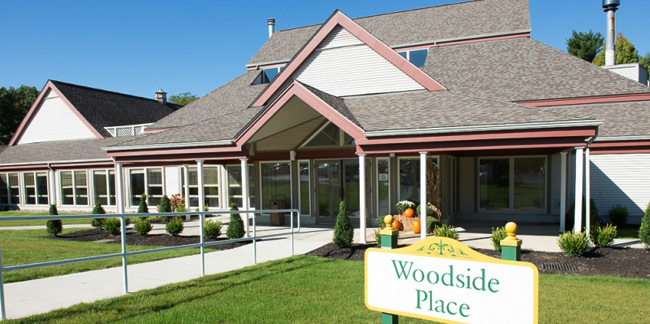Woodside Place on the Oakmont campus
The standard of care for those living with Alzheimer’s or dementia.
Like other forms of dementia, Alzheimer’s is a progressive, multi-stage disease with ever-changing care needs. Our nationally recognized Woodside Memory Care program maximizes the quality of life for people living with Alzheimer’s and dementia, wherever they are along their life’s journey. Many individuals start out just needing assistance with activities of daily living such as dining and dressing and later progress to requiring full-time skilled nursing care. That is why we provide a full continuum of care on one campus. The proven Woodside Program combines an innovative philosophy of care with unique design features, providing a flexible, yet secure living environment.
In 1991, Presbyterian SeniorCare Network developed Woodside Place, one of the first residential personal care communities of its kind in the United States designed specifically to meet the physical, social and psychological needs of persons living with Alzheimer’s disease. Here, memory care residents experience considerable freedom of choice in a secure environment while engaging in everyday activities that create a sense of purpose and nurture social connections.
From its inception, Woodside Place challenged the traditional nursing home model of care with a new social model, a flexible care program and architectural innovation. Two decades later, the Woodside Program model remains cutting-edge and relevant in serving the increasing needs of people living with Alzheimer’s and dementia conditions In addition to full-time residential living, we also offer full or half-day Adult Day programs at Woodside Place. Click here to learn more about our Memory Care.
Every team member in our organization—from nursing and therapy to housekeeping and maintenance—receives dementia-specific training and is certified through CARES®. Woodside Place direct care team members receive additional specialized training, and benefit from the expertise of certified dementia care practitioners throughout Presbyterian SeniorCare Network.
Adult Day services allow people living with Alzheimer’s and dementia to socialize and enjoy recreational activities in a safe and secure setting. Not only does this help to boost engagement for participants, but it also offers a bit of respite for caregivers. The goal of Adult Day is to provide extra support through appropriate programming offered outside of the home in order to help individuals remain in their homes for as long as possible. Many people living with Alzheimer’s and dementia eventually transition to campus living as additional care is needed that may be better delivered in a specialized Memory Support setting.
Consider Adult Day Services if:
- You are a full-time caregiver: Adult Day Services can provide a much-needed break. While your loved one is at Adult Day, you’ll have time to rest, run errands or finish other tasks.
- You work during the day: Adult Day Services can help you to balance a job with caregiving duties.
- You want a safe, caring environment for your loved one: Adult Day Service is a chance for your loved one to share time with peers and participate in engaging activities such as music and exercise programs, as well as fun outings.
Through a unique collaboration with the Carnegie Museum, we create specialized programs that provide for rewarding and enriching experiences. For example, each month, a small group of residents from Oakmont’s Woodside Place hop on the Presbyterian SeniorCare Network van and travel to the Warhol Museum or the Carnegie Museum of Art.
- The half-day Warhol experience is very hands on—residents create their own piece of art “Warhol-style,” enjoy a snack and take a guided tour of one of the museum’s dramatic galleries. Learn more about the experience from the perspectives of Woodside Place Recreation Supervisor Tina Opina and Social Worker Jen Marasco Kuhn.
- The “In the Moment” program at the Carnegie Museum of Art features docent-led tours that stimulate good discussions and a deeper visual appreciation of art. During the tour, residents are asked about the piece they are viewing, what it reminds them of and how they feel when looking at the art.
Music has the ability to reach residents living with Alzheimer’s in ways that no other therapy is able to achieve. Woodside Place provides a variety of musical activities, usually multiple times a day. Music therapists visit campus or a group of student volunteers serenades the Oakmont residents to ensure that music is always part of the daily life of our community.
Additionally, Woodside Place offers Music & Memory™, an innovative approach to dementia care pioneered by Dan Cohen and supported by neuroscience research. The program is an example of our focus on person-centered care. Through Music & Memory, Woodside Place team members create and provide personalized playlists that enable those living with dementia to reconnect with the world through memories triggered by the music they love. Residents listen to their favorite music through the popular iPod digital music player.
Learn more about Music & Memory at http://musicandmemory.org/music-brain-resources/music-and-the-brain/.
Developed as a way to teach children, Montessori-based programming is proving to help adults living with dementia. American psychologist Cameron Camp developed the first Montessori program for dementia care in the late 1990s to help individuals living with dementia retain their dignity and independence by stimulating physical and mental activity. At our Oakmont campus, several care team members are trained in the Montessori Method, a non-structured approach to teaching residents in a way that emphasizes each individual’s strengths and abilities. The program helps residents try to regain lost motor skills, while also giving them a vital role to fill each day.
Adaptive technology can help individuals living with Alzheimer’s stay connected and engaged with the world. By integrating hardware, software, media, ergonomic and adaptive components, iN2L allows our team members to tailor experiences to individual or groups. From using email and video chat to mind-stimulating activities and games, residents enjoy sensory experiences, spiritual content, video exercise programs and more that is tailored to each of them. At Oakmont, residents with a wide range of physical and cognitive abilities—many of whom have never used a computer—are now enjoying technology, using systems adapted especially for them.






